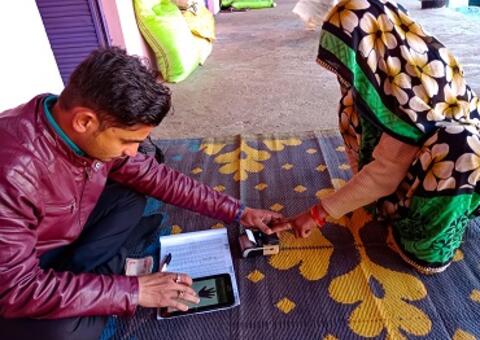Blog
Microfinance Institutions vs. COVID-19: The Real Asset Lies in the Global Networks
Jul 08, 2020

A virtual roundtable summary.
As the COVID-19 pandemic continues to create new challenges for MSMEs, global microfinance networks have been forced to rethink their approaches to microfinance and supporting SME clients. The largest microfinance networks work on several continents and serve millions of clients through partner organizations. Thus, their response to lockdown conditions impacts millions of SMEs. While the nature of these institutions has allowed them to apply successful response policies broadly, the pandemic has also highlighted new ways for these organizations to grow and improve.
In its twelfth COVID-19 mitigation webinar, the SME Finance Forum focused the roundtable on how these global microfinance networks are coping with the impacts of the pandemic. Through a moderated discussion, Steven Duchatelle (Advans Group), Bernd Zattler (Access Microfinance Holding), Andrée Simon (FINCA Impact Finance), Guillaume Lesay (Baobab Group), and Victoria White (Accion) explored their organizations’ response to the crisis and how global microfinance networks have learned and changed as the crisis evolves.
The nature of these microfinance networks has allowed partners to learn from regions hit with COVID-19 lockdown conditions earlier and apply preventative measures quickly in regions that have been more recently impacted. Guillaume Lesay noted that Baobab’s experience in China had been extremely helpful to partners in other regions, as they could implement the best practices used during the lockdown and better prepare for work-from-home. For FINCA Impact Finance, these lessons led to limiting loans in African offices well before many countries there were hit with COVID-19. This measure helped preserve liquidity and prevented putting out loans that would be hard to manage or recover. Bernd Zattler also noted that Access Holdings had prepared regional banks in Africa to preserve liquidity based on their experience responding to the pandemic in Germany. The ability of these microfinance networks to guide partner response based on early experiences is a crucial strength. It has allowed members in Africa and Latin America to benefit from the experience of banks and financial institutions in Asia and Europe.
Throughout the discussion, the speakers highlighted key takeaways from their organizations about the nature of the crisis and which government responses have been most successful thus far. Victoria White highlighted the importance of staying connected to clients despite having closed offices, emphasizing that the digital divide inherently disadvantages some MSMEs. This sentiment was echoed by Steven Duchatelle, who noted that the crisis has led to necessary accelerated digitization for some of Advans subsidiaries while keeping human connection at the center of their response. Andrée Simon spoke to the challenges of the crisis on an institutional level, explaining the difficulty of ascertaining the condition of their portfolio due to the high volume of loan restructuring. She also noted that to address this delay in receiving and analyzing information, many microfinance networks have been collaborating and sharing information to guide collective response. The panel also addressed government-mandated moratoriums, pointing to the ways in which they tie institutions hands and limit their ability to determine which clients are willing and able to pay despite current conditions.
Microfinance networks have also taken the opportunity to learn from the crisis about ways to improve moving forward. Bernd Zattler emphasized the importance of giving more control to individual banks and financial institutions so that they can respond to local circumstances. He noted that Access was shifting to serving as a supportive network rather than a directive organization. These individual bank innovations and responses have served as some of the most successful policies, and a decentralized network or holding group can allow for this specific response and use it to guide and inform the actions of other members. Overall, these institutions must focus on long-term value-added of their networks, whether through increased digitization or policy guidance, and learn from the lessons of COVID-19 to ensure future success.










